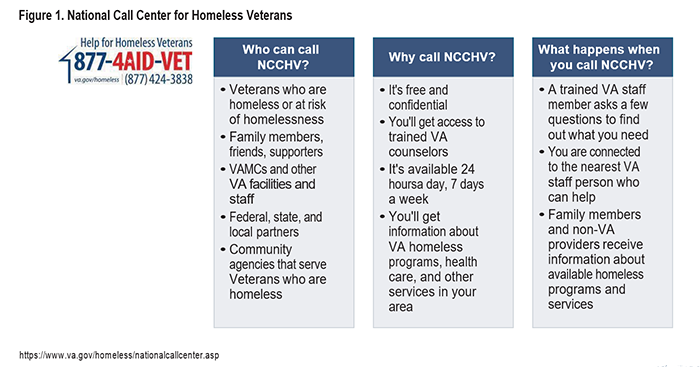
|
|
Research HighlightThe National Call Center for Homeless Veterans: Preventing Homelessness among Veterans for Over a DecadeKey Points
According to the Annual Homeless Assessment Report to Congress, the number of Veterans identified as experiencing homelessness on a given night in January every year has decreased by approximately 50 percent between 2009 and 2023. This reduction is likely due in large part to the comprehensive, well-funded, and multi-level response deployed by the U.S. Department of Veterans Affairs (VA) across the three levels of public health prevention: 1) primary or universal prevention through screening all Veteran outpatients using VA’s Homelessness Screening Clinical Reminder; 2) secondary or selected prevention through programs such as the Supportive Services for Veteran Families (SSVF) program; and 3) tertiary prevention through the U.S. Department of Housing and Urban Development-VA Supportive Housing (HUD-VASH) program. An overarching and widely available service – the National Call Center for Homeless Veterans (NCCHV) – has been understudied and offers a robust opportunity to address homelessness prevention among Veterans who are both engaged and not engaged in VA care. NCCHV is different from the Veterans Crisis Line: NCCHV is dedicated to serving Veterans at risk or experiencing homelessness. NCCHV began operations in March 2010 to provide access to trained call center responders offering information, referrals, and linkages to services for Veterans at risk of or experiencing homelessness. NCCHV is available 24 hours a day, seven days a week, with the objective of connecting Veterans to services provided by both VA and community-based providers. Individuals who contact NCCHV may be Veterans, family members, or VA or non-VA providers; contacts are made via telephone as well as a web-based chat function. Veterans are not required to be eligible for or engaged in VA services to access NCCHV. Although tremendous gains have been made in reducing homelessness among Veterans, there is an ongoing need to prevent future episodes of housing instability. While VA offers solutions to address housing instability, it is imperative to connect Veterans who are at risk of homelessness with these resources. A preliminary analysis of data collected between November 30, 2018, and October 31, 2020, found that more than 110,000 unique Veterans called NCCHV; more than two-thirds of these calls were placed by Veterans who reported being at risk of homelessness rather than experiencing literal homelessness (i.e., staying in an emergency shelter or a situation not intended for human habitation). Given this, the NCCHV has the potential to prevent more severe experiences of housing instability by addressing upstream concerns reported by Veterans such as unemployment, lack of income to provide adequate housing, and other challenges. To identify best practices to ensure Veterans can access needed resources, the study, “Keeping the Front Door Open: Preventing Homelessness through the National Call Center for Homeless Veterans,” will employ a mixed methods approach using administrative data documenting contacts with NCCHV and subsequent services utilization among Veterans. We will also examine data collected through qualitative interviews with Veterans and other key informants including leadership and providers. The aims of the study are to: 1) describe characteristics and needs of Veterans accessing NCCHV using existing administrative data collected through NCCHV and VA’s electronic health record; 2) assess Veterans’ outcomes following contact with NCCHV; and 3) identify optimal practices for linking Veterans with services following a contact to NCCHV. Since the commencement of this study in October 2023, the project team has focused largely on accessing 2019-2023 data from NCCHV and linking these data with the Master Veteran Index. During the observation period, there were almost 803,000 contacts with NCCHV, including approximately 276,000 unique Veterans, 19 percent of whom reported current homelessness and 72 percent of whom reported being at risk of homelessness. The next step is to compare Veterans who are and are not engaged in Veterans Health Administration (VHA) care in terms of key socio-demographic indicators (i.e., housing status, age, gender). We will then conduct interviews with a sample of Veterans who are and are not engaged in VHA care to identify their needs related to housing instability and other adverse social determinants of health, experiences accessing care, and satisfaction with and preferences for care. We will also be reviewing audio recorded calls to NCCHV to evaluate them for quality and identify ways to improve the Veteran-centric care being provided. For Veterans who are engaged in VHA care, we will evaluate linkages with services, long-term housing stability, and mortality. To better understand how NCCHV operates and to identify strategies to link Veterans with effective care, we will conduct qualitative interviews with NCCHV responders and leadership as well as VHA Homeless Program staff. 
References
|
|